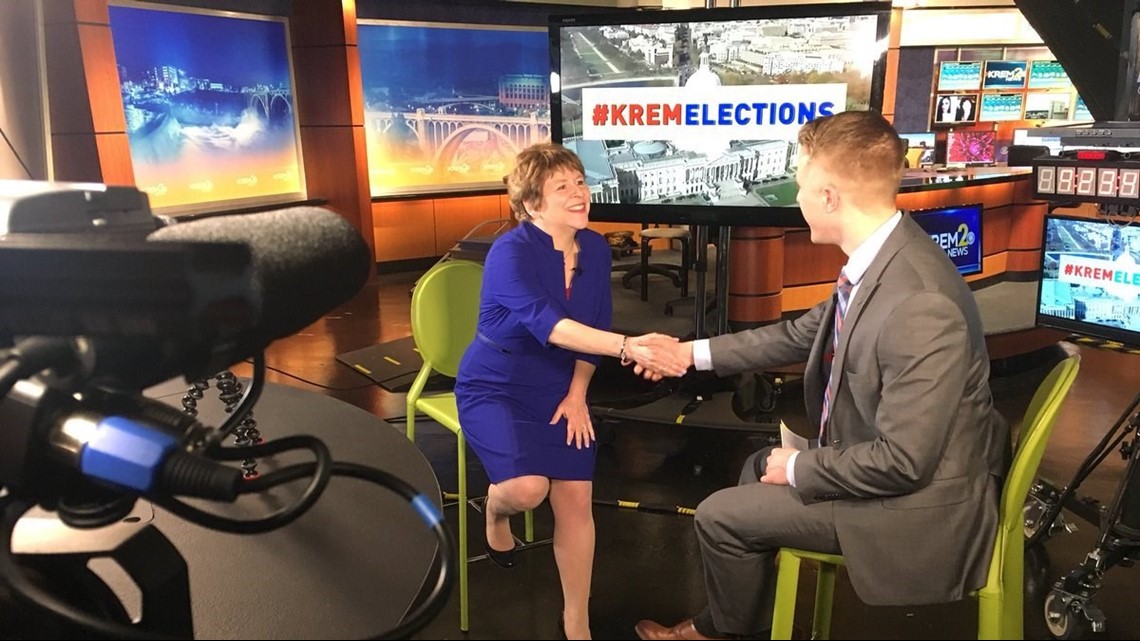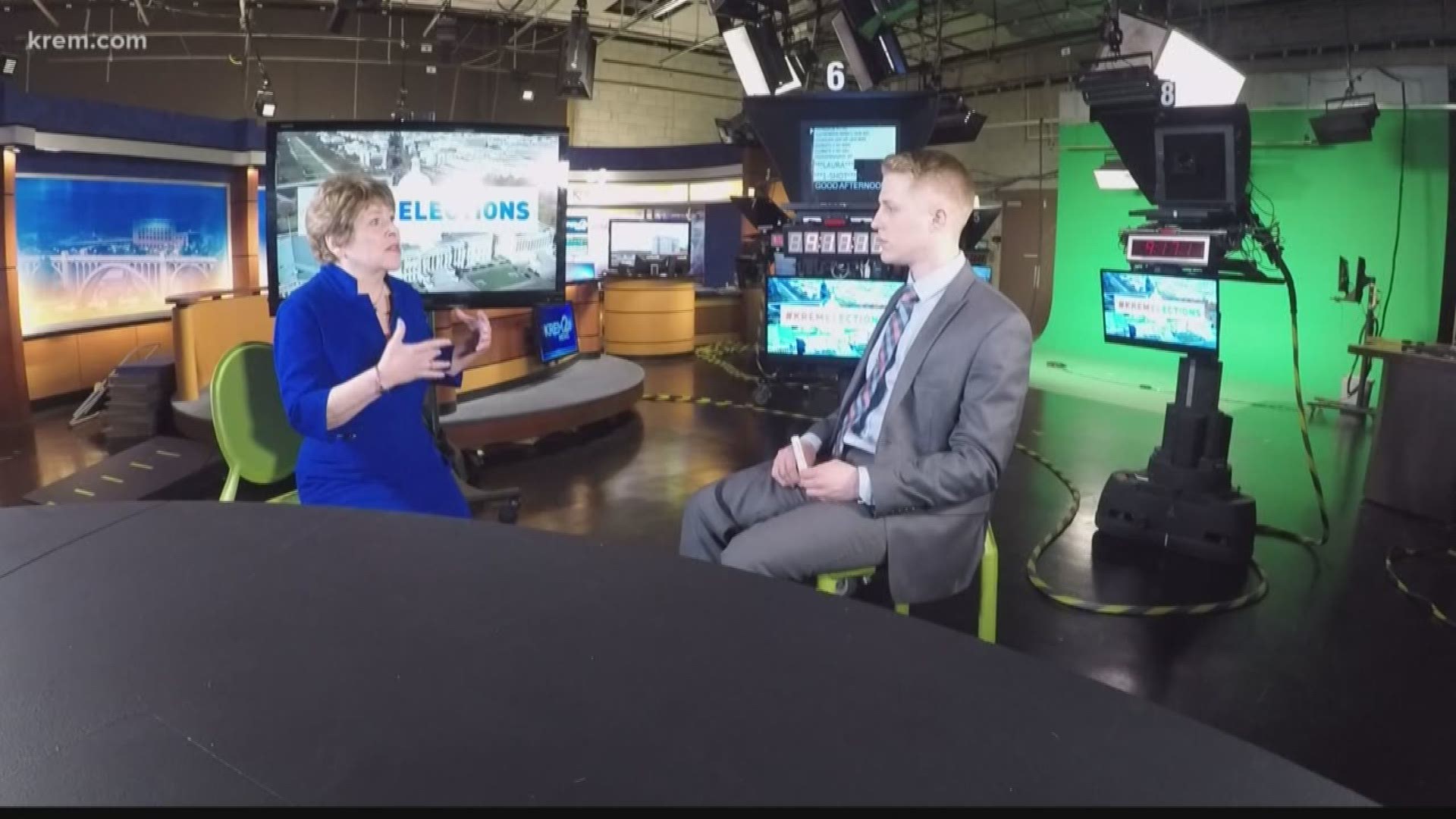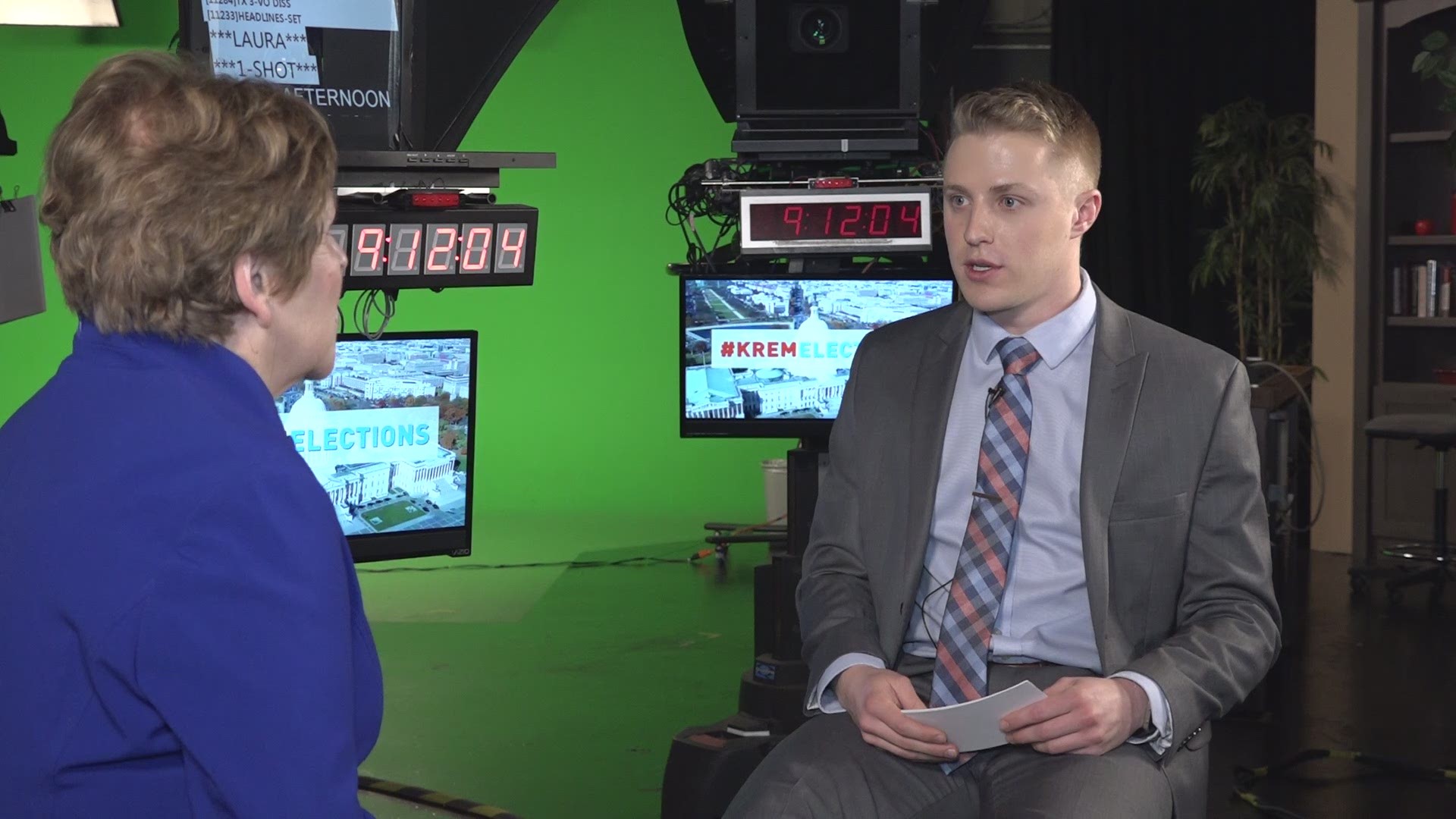This election cycle, KREM wants to ask the candidates questions that matter to you, the viewers.
So last week reporter Rob Harris collected your questions on Facebook Live and Twitter, and sat down with candidates.
First up this week is a question and answer session with Democratic candidate Lisa Brown.


Q: So, let’s not waste any time. I’m going to dive right into my first question from Davis Harsh on Facebook. He asks what you’re going to do to stop gun violence. And I think I’m interested too in your reactions to the March for our Lives which we just saw.
A: Well, as a mother and someone who’s spent a lot of time in classrooms here in our region, I was really inspired by the students who stood up, spoke out. Also the teachers and parents who supported them. And I believe we’ve been presented with a false choice that we can’t improve safety unless we somehow take away constitutional rights. There’s some common-sense things. Right from the start Congress should be banning bump stocks and high capacity magazines, and should actually be bringing evidence forward. I think a bipartisan commission would be fantastic so that we’re all listening to the same information and taking it out of a political framework of this party or that party.
Q: So where do you see that line between ‘common sense gun reform’ and curtailments on the Second Amendment?
A: Well, interestingly I’ve been doing community meet and greets with communities across the district, and it’s gun owners in Republic and Deer Park and Walla Walla who have stood up in public meetings and said, “I’m a gun owner”--and I myself was raised in a rural community in a gun owning family--these gun owners have stood up and said “and I know we can do better.”
Q: Next question from Nikki on Twitter. She asks “What do you plan to do with the ‘sandwich generation.’ Those of us saving for our kids’ college, while struggling to pay our own student loan debt, paying for day care and elder care for our parents.”
A: That is a great question, and many of us I think are experiencing this where we may have concerns for our parents who are living on Medicare and social security. So one of the things is in Congress I will defend those earned benefits of social security, Medicare. IN fact there’s still not enough protections for retired Americans who have lived and worked and now are facing potential insecurity in retirement. And at the same time, one of my top priorities is the student loan debt crisis. It’s over a trillion dollars. I think we should be asking ourselves, ‘If Congress can bail out financial institutions, why no relief for students.
Q:Next question from Marsha Lord on Facebook: If healthcare is such a big issue for folks in DC, why haven’t they designed a universal system we can all use similar to Medicare. Would you be in support of something like Medicare for all?
A: I think we need to move in the direction of expanding Medicare. We definitely need universal comprehensive and affordable coverage. One of the good things about the system that was put in place a couple of years ago is it did expand coverage, but we haven’t done anything to take on the cost of prescription drugs. I showed in Olympia that I could do that. I took on insurance companies to cover eating disorders, helped expand the children’s health program. So those are the kinds of measures I will also pursue in Congress.
Q: We had several questions about taxes. I know you’ve been critical of the tax bill--tax bills--that were passed at the end of last year. What would you have been advocating for if you were in Congress at the time?
A: It was a missed opportunity to provide relief in some areas like the student loan debt crisis, so that’s number one. Second it clearly funneled most of the benefits to the top income earners. And that’s not who really needs the help. And then third, it added a lot to the national debt. And now, we see Paul Ryan, speaker of the house, starting to talk about ‘well now we’ve got to cut. We’ve got to cut Medicare, we’ve got to cut social security.’ I just think that’s wrong, and we’ve got to protect those benefits. On the other hand, there are still loopholes in the tax structure like the carried interest loophole. It’s basically a big financial loophole. Again, we could get millions of dollars of benefits if we closed that loophole.
Q: Mel on Facebook: Will you work to remove Spokane as a sanctuary city? So, we’ve seen the president talk about this and Congress, about restricting federal funds from so called ‘sanctuary cities,’ so where do you stand on that and how that might impact Spokane?
A: Well interestingly, Mel, here in Spokane the mayor, the city council, the sheriff and local law enforcement are all on the same page. So they’ve set a priority for how to use our local law enforcement resources and I support that. The federal government has a role when it comes to illegal immigration but local government resources, our tax dollars I believe are being appropriately utilized. I think we have agreement here and there’s no reason for the federal government to come in and interfere with the policies we’ve put in place.
Q: Shane asks ‘Are you going to support our president?’ I know you’re from the other party, but are there any policy proposals you’ve heard from him that you would support?
A: I think it’s really important to put country over party, to put Eastern Washington’s interests over special interests, and so when the president does something I agree with I will definitely call out my support for that, and if the president is doing something that’s not in the best interest of Eastern Washington--and I would highlight his agriculture and trade policies right now are not in the best interest in Eastern Washington--then I would call him out and oppose him. And I have to say it’s the same thing in my own party. If leadership in my party said something I disagreed with, I would be happy to say, “sorry, that’s not in the best interest of Eastern Washington.”
Full video:
Wednesday we will have an interview with congresswoman Cathy McMorris Rogers, and Thursday Jered Gavin Bonneau.


